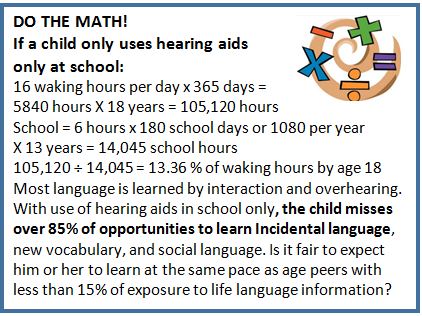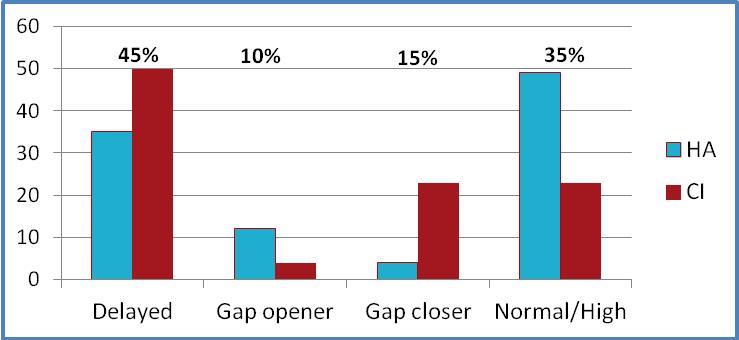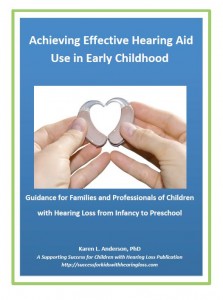Related Products
For Parents
Related Teacher Tools Takeout Items
Does he have to wear his hearing aids? Really? He seems to hear okay!
 The fact that your son or daughter has a hearing loss was probably a huge surprise for you and never one you wanted or even considered. Hearing that your child needed hearing aids may have been a very emotional time for you. Yet you love your child and want the best possible future for him or her. You’ve been told that he needs to wear hearing aids, but why ALL waking hours?
The fact that your son or daughter has a hearing loss was probably a huge surprise for you and never one you wanted or even considered. Hearing that your child needed hearing aids may have been a very emotional time for you. Yet you love your child and want the best possible future for him or her. You’ve been told that he needs to wear hearing aids, but why ALL waking hours?
Why it is critical for your child to wear his hearing technology all waking hours if your goals for him are:
- participating in family discussions by listening and speaking similar to other children his age
- chatting with friends using listening and speaking; being able to express himself similar to age peers
- it takes 20,000 hours of listening before a child’s brain is ready to learn to read – delays in hearing = delays in reading
- keeping up with the pace of classroom learning by using his hearing, listening, speaking
Summary of information that is explained below:
- 90% of what a child knows by age 5 is learned picked up unintentionally without being taught.
 Hearing loss limits the exposure of children to incidental language.
Hearing loss limits the exposure of children to incidental language. - Your child can seem to hear okay, but is actually not hearing all of the sounds of speech causing him to always be ‘putting the speech puzzle together’ or to seem to ‘tune out.’ Also, if you want him to produce clear speech, he needs to hear speech as clearly and consistently as possible. Clear speech is associated with better social acceptance too!
- Most children who start school with language delays do not catch up. You cannot lapse in supporting your child’s full-time hearing aid wear in early childhood and expect him to catch up once he goes to school.
- Hearing loss and the future. Early learning opportunities and/or use of amplification makes all the difference in how well your child will be able to function in the hearing world as an adult.
- See what powerful messages you may be sending to your child! Your child is learning his attitude about his hearing aids and himself from you.
 90% of what a child knows by age 5 is learned incidentally, being picked up unintentionally without being taught. Hearing loss causes children to have smaller listening bubbles, meaning that they are not exposed to as much incidental language. Research has shown that typically hearing children are exposed to 13 million to 45 million words by the time they are age 3(video info). The size of their exposure to language has been found to be directly linked to vocabulary, listening, syntax and reading comprehension at age 9. Your child with hearing loss is likely exposed to fewer words than 13 million words by age 3 UNLESS he is receiving the best possible access to sound through hearing technology all of his waking hours AND family members are intentionally supporting growth in language (words, concepts, speech, idioms, jokes, sarcasm, social cues, etc). Language is caught, not taught! Consistent hearing is an important foundation for growing brains that process information more effectively and is the basis for trusting loved ones. Brain Development and Hearing Loss Consistent hearing for developing trust and confidence
90% of what a child knows by age 5 is learned incidentally, being picked up unintentionally without being taught. Hearing loss causes children to have smaller listening bubbles, meaning that they are not exposed to as much incidental language. Research has shown that typically hearing children are exposed to 13 million to 45 million words by the time they are age 3(video info). The size of their exposure to language has been found to be directly linked to vocabulary, listening, syntax and reading comprehension at age 9. Your child with hearing loss is likely exposed to fewer words than 13 million words by age 3 UNLESS he is receiving the best possible access to sound through hearing technology all of his waking hours AND family members are intentionally supporting growth in language (words, concepts, speech, idioms, jokes, sarcasm, social cues, etc). Language is caught, not taught! Consistent hearing is an important foundation for growing brains that process information more effectively and is the basis for trusting loved ones. Brain Development and Hearing Loss Consistent hearing for developing trust and confidence
Your child can seem to hear okay, but is actually not hearing all of the sounds of speech. Because of your child’s hearing loss, he will be missing some, much or all of the language occurring around him at a distance of 3-6 feet or more. This is true even if a child has a ‘mild’ hearing loss and wears hearing aids because hearing aids do not restore normal hearing. You might want to try the Early Listening Function (ELF) test to discover the size of your child’s listening bubble.
As a family, you can make up for the ‘missing language input’ by making sure you are within a couple of feet when you talk to him, making sure he wears his hearing aids, and/or making sure you are using visual communication, like sign language or cued speech. Even if a child ‘seems to hear okay’ without hearing technology it is likely that he is not hearing 15%, 25%, 35% or more of what you are saying in the form of missed pieces of words.
 Ommee! Iz ime oo et or akak ur ool! This sentence doesn’t make much sense. Now picture yourself in the kitchen with your child at the table. It’s now time for him to leave and you call out a reminder. Here’s a clue: the child’s name is Tommy. Can you figure out the sentence? Did the visual clue help? Time of day and routine? Sure they did! This is how it can seem like your child is hearing pretty well, even without hearing aids. Now consider the following sentence.
Ommee! Iz ime oo et or akak ur ool! This sentence doesn’t make much sense. Now picture yourself in the kitchen with your child at the table. It’s now time for him to leave and you call out a reminder. Here’s a clue: the child’s name is Tommy. Can you figure out the sentence? Did the visual clue help? Time of day and routine? Sure they did! This is how it can seem like your child is hearing pretty well, even without hearing aids. Now consider the following sentence.
EE aireeka ontatooshun iza azit or r oz. This sentence might be said in a school social studies class. When children have hearing loss and do not use  amplification the words run together, endings are often not heard and some sounds can be interpreted as other sounds. Can the child hear? Yes, most children have some usable hearing. Can he understand what was said? Can he do so in the same amount of time as his classmates who hear typically? Children who have to spend extra effort ‘listening’ have fewer cognitive resources to understand what was said and become very tired by the end of the day. If you had to really work all the time to try to figure out what the teacher was saying, like the sentence above (The American Constitution is the basis for our laws), do you think you could keep up? If your child is very smart he may be able to keep up. But think of what he may become and how well he may do if he could hear his best….
amplification the words run together, endings are often not heard and some sounds can be interpreted as other sounds. Can the child hear? Yes, most children have some usable hearing. Can he understand what was said? Can he do so in the same amount of time as his classmates who hear typically? Children who have to spend extra effort ‘listening’ have fewer cognitive resources to understand what was said and become very tired by the end of the day. If you had to really work all the time to try to figure out what the teacher was saying, like the sentence above (The American Constitution is the basis for our laws), do you think you could keep up? If your child is very smart he may be able to keep up. But think of what he may become and how well he may do if he could hear his best….
One more point: Garbage In – Garbage Out! Children with hearing loss often have imperfect or ‘different’ speech because they are producing speech that sounds like the speech they hear. The clearer and more consistently your child hears, the clearer his speech will be. Parents sometime notice that when a child gets new hearing aids, speech clarity improves – this is because more of the speech signal is being consistently heard. Research has found that children who had less intelligible speech (from slightly different to ‘mushy’) felt more lonely. The findings suggest that development of intelligible spoken language has the power to close the gap between children with hearing loss and their hearing peers, resulting in increased social interaction, an improvement in group work, and a change in the teachers’ and students’ perception of the child with hearing loss adds.
because they are producing speech that sounds like the speech they hear. The clearer and more consistently your child hears, the clearer his speech will be. Parents sometime notice that when a child gets new hearing aids, speech clarity improves – this is because more of the speech signal is being consistently heard. Research has found that children who had less intelligible speech (from slightly different to ‘mushy’) felt more lonely. The findings suggest that development of intelligible spoken language has the power to close the gap between children with hearing loss and their hearing peers, resulting in increased social interaction, an improvement in group work, and a change in the teachers’ and students’ perception of the child with hearing loss adds.
Most children who start school with language delays do not catch up. Research information by Christie Yoshinaga-Itano considered 135 children and tracked their language growth from age 4 to age 7. There were 38 hearing aid users with mild-profound hearing loss and 49 cochlear implant users. All were cognitively normal and came from English-speaking families with hearing parents.
were cognitively normal and came from English-speaking families with hearing parents.
Of the children who entered school with delayed language skills, 85% did not catch up by the end of 2nd grade. Practical experience tells us that if children haven’t caught up by then that it is unlikely that they will do so. And this is for children who were wearing hearing devices. Without hearing devices it is likely that a child will start school with a delay and that delay will only grow over time. NO children who were born with profound hearing loss were able to catch up. It is clear that the time to make the most difference in language and learning is in giving a child the best possible start using full time hearing aid wear, or if they are not using amplification, surrounding them full time with visual communication.
Hearing loss and the future: A 2001 study by Blanchfield et al. found that at that time, approximately 44% of individuals with severe to profound hearing impairment did not graduate from high school compared to just 19% of the general population. Only 5% of students with severe to profound hearing impairment graduated from college. Furthermore, 42% of the severe to profoundly hearing impaired population between 18 and 44 years of age did not work, whereas only 18% of the general population did not work.
Fortunately, access has improved supporting early intervention services for families resulting in better communication ability at school age, regardless of the communication method used at home. In addition, based on family choice,early implantation of CI technology has become the standard treatment for profoundly deaf children during the past 2 decades resulting in improved educational outcomes of deaf children (Boons et al., 2013; Geers & Sedey, 2011).
Regardless of these improvements, children with hearing loss remain at high risk for language problems that are likely to effect academic and professional success throughout their lifetime (Nittrouer, Caldwell, Lowenstein, Tarr, & Holloman, 2012; Traxler, 2000).
If you want your child to listen and speak (versus being a part of the Deaf community, using ASL) then the path to a successful future MUST include consistent use of hearing devices starting in infancy, all waking hours. This is true regardless of degree of hearing loss. If you would prefer to use American Sign Language, it is very important that you become involved with the Deaf community so that you can become truly proficient in this language.
Article Hearing Aids for Children Should Not Carry a Social Stigma. An interesting insight and findings on the difference hearing aids make for children with “mild” hearing loss.
Printable handout of Attitude is Caught, Not Taught
Attitude is Caught, Not Taught
The behavior of parents sends powerful messages to their children. Your child learns about himself from you, his first and most important teachers.
If you encourage him to hide his hearing aids he will believe that you are embarrassed or ashamed of him. He needs to hear in the store, at church, at community events, etc. Being able to select bright colors for hearing aid cases and earmolds involve him and make him feel good about these neat ‘ear computers’.
If he is not wearing his hearing aids at home you are showing that it is okay with you if he does not participate fully in family conversations. This sets up feelings of being ignored or an expectation that it is someone else’s responsibility to make sure he understands or get him the information he needs. This creates greater dependence and helplessness at an older age. Without hearing all of the language at home he can’t keep up with vocabulary and language learning of other children his age. Weekends are important listening times! Taking a short break is okay (i.e., 30 minutes to read silently), but auditory brain stimulation should continue throughout the afternoon, evening or mornings before school. Minutes not hearing his best at home contribute to growing gaps in learning at school.
If you minimize the impact of hearing loss (I think his hearing is really okay…) on his ability to listen and learn, he is learning that you do not like that part of him – the part that needs hearing aids to perform his best in school. And that you reject him for who he is, a child with a hearing loss. And sometimes that he is a bad person for having a hearing loss and to be a good person he needs to pretend that he can hear, even when he is struggling. And finally, he may be learning from you that it is better to be viewed as naughty or not able to learn well than it is for people to think he has a hearing loss.
If you ignore the need to address the hearing loss you are putting your child at risk for being a victim. He does not know what he does not hear which sometimes results in him stating information that makes no sense in the context of what was said or heard by others around him. This makes him seem more different than he would if he could hear/communicate better and can contribute to bullying or greater feelings of not fitting in. Rather than believing the problem is because he has a hearing loss and misheard, your child may grow to believe that there is some reason why he deserves to be treated badly by others, like being stupid or weird. Families are in the best position to help their children be resilient to harassment or feelings of not fitting in by linking instances of miscommunication to mishearing, while reinforcing that the hearing loss makes it more challenging for him, but the issue is only that – not that he is a bad person, incapable, strange, etc.
Your child wants to please you. Too many children purposely damage or lose their hearing aids because they believe their parents would rather not have them use the devices or will not really love them if they wear hearing devices. Some children knowingly choose to become ‘the slow student in class’ rather than performing their best with their hearing aids because this is what they believe their parents would prefer them to be.
Without family support and acceptance of the child for all of his characteristics and strengths, few children succeed to reach their potential.
If your child has usable hearing, the level of educational and/or social success he will achieve is directly related to the number of hours he wears his hearing aids each day. If he doesn’t have usable hearing and is a visual learner all of the above applies for children who live in families who learn only a minimal number of signs.



